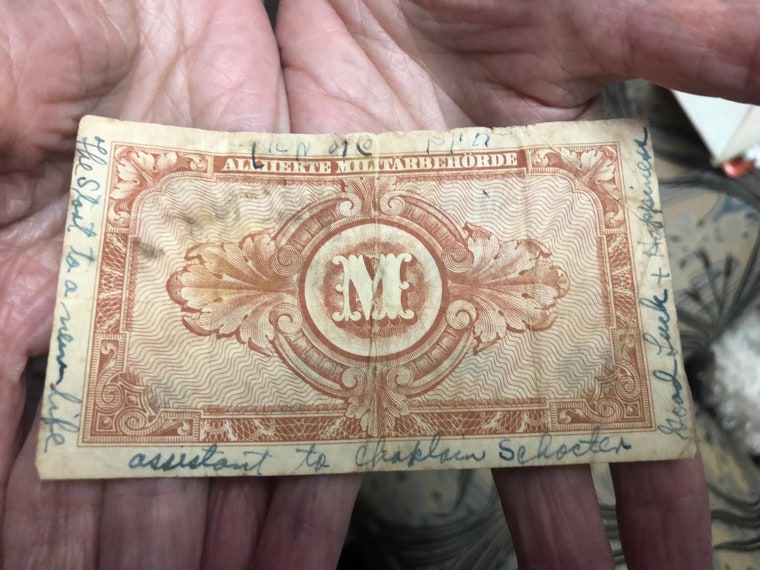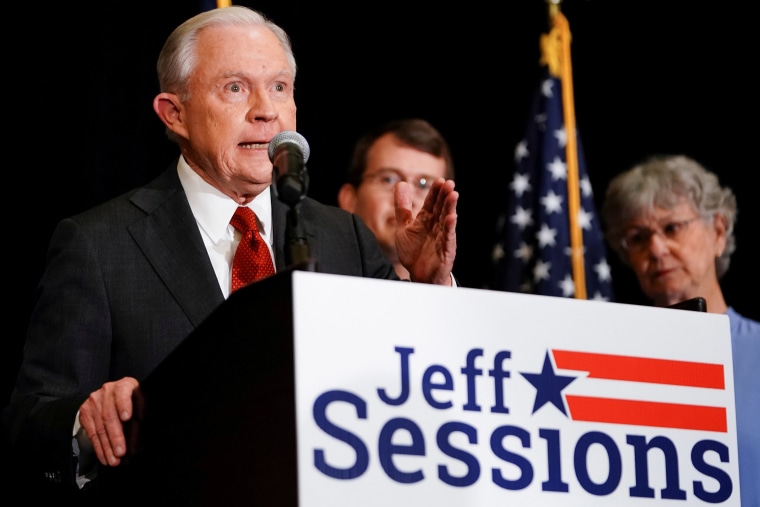Good morning, NBC News readers.
Months into the coronavirus pandemic, COVID-19 is spreading faster than ever in the U.S., Jeff Sessions lost his bid to win back his old job and President Donald Trump struggles to land a punch on Joe Biden.
Here's what we're watching this Wednesday morning.
As coronavirus cases soar, doctors and patients wonder: Is it possible to get reinfected?
The coronavirus is spreading across the United States faster than at any other point in the pandemic, and the rise of new cases has accelerated in July.
Before July 1, the country had never seen a day in which 50,000 new coronavirus cases had been confirmed. Since then, the record has been surpassed 11 times, according to an NBC News tally of cases.
And three U.S. states — Florida, Texas and California —account for about one-fifth of the world's new cases.
As the number of new COVID-19 infections continue to soar, doctors and patients are wondering: Is it possible to get reinfected?
Unfortunately, the short answer seems to be, yes.
Emerging research suggests that levels of protective antibodies may fade after just a few months.
The body's immune system is designed to fight infections by producing antibodies to viruses. But a growing pool of data suggests COVID-19 antibodies wane about 60 to 90 days after infection.
"The nightmare of this is based on how much we don't know," said Dr. Michael Saag, associate dean for global health at the University of Alabama, Birmingham. "COVID is brand new. We're discovering as we go."
Here are some other developments:
- Hospitals have been ordered to bypass the CDCand send all COVID-19 patient information to a central database in Washington beginning Wednesday, raising concerns from health experts that the data will be politicized or withheld from the public.
- "You can trust me": Dr. Fauci responded to White House efforts to discredit him by saying the public can trust "respected medical authorities" — like himself.
- The federal stockpile is thin as the Trump administration pushes for reopening amid virus surge.
- In the hunt for a vaccine, Moderna, a Cambridge, Massachusetts-based biotech company, says it has had promising results for its coronavirus vaccine as they aim to start its final phase of testing.
- Track U.S. hot spots where COVID-19 infection rates are rising.
- The U.S. death toll from coronavirus has surpassed 137,000 according to NBC News' tally.
Jeff Sessions lost GOP primary bid to reclaim his old Alabama Senate seat
Former Trump Attorney General Jeff Sessions lost his primary bid for his old Senate seat Tuesday, the Associated Press reported.
Sessions held the Senate seat for 20 years but left it to serve as attorney general under President Donald Trump.
The Alabama Republican helped Trump's insurgent presidential bid tremendously as the first senator to back him.
But the relationship between Trump and Sessions soured when the attorney general wouldn't intervene in the investigation into Trump's campaign dealings with Russia.
Now former Auburn University football coach Tommy Tuberville will go on to face Democratic Sen. Doug Jones in November.
Inside the Trump campaign's struggle to land a punch on Biden
President Trump's political advisers have bluntly told him he can't win the November election if the campaign is about him, and for weeks they unsuccessfully urged him to pivot to a new strategy focused on his general election opponent, Joe Biden.
Trump finally appeared to heed the advice Tuesday, although the setting and the tone of the political broadside may not have been what his advisers had envisioned, NBC News' White House reporters write.
Trump's remarks, which mentioned Biden 31 times, were monotone, and the backdrop — the White House Rose Garden — was a break from longtime presidential efforts to separate official and re-election business.
Trump has been throwing everything he's got at Biden, but nothing is sticking.
"It's difficult to attack vanilla," quipped one Republican observer.
A new Cold War between the U.S. and China may have already begun. Here's what it might look like.
For decades, conventional wisdom in U.S. foreign policy held that if the West traded and engaged with China, it would gradually open up its political system and curb its rogue behavior, from extravagant maritime claims to trade protectionism to widespread intellectual property theft.
But in recent years, as Chinese President Xi Jinping has doubled down on those policies in a hard-line approach, the consensus has shifted.
Now as the U.S. and China spar on the world stage, NBC News' intelligence and national security correspondent Ken Dilanian writes that Cold War 2.0 may have already begun.
Divided by COVID-19: The couples stuck thousands of miles apart by travel bans
Leah Howd is worried that her 5-month-old son, Johan, won't remember his father when they are finally reunited.
"He is too small to understand the person on the computer monitor is his dad," she said.
Howd, 39, of Peoria, Illinois, hasn't seen her partner, Bas Bruurs, 41, of the Netherlands for three months — they are among thousands of couples now kept apart in different corners of the world by COVID-19 travel restrictions.
The U.S. has banned most foreign travelers from Europe since March, while the European Union barred Americans from visiting its 27 member states July 1.
NBC News' Social Newsgathering team spoke to Americans desperate to be reunited with their partners who are using social media hashtags such as #LoveIsEssential and #LoveIsNotTourism to spotlight their stories.
Want to receive the Morning Rundown in your inbox? Sign up here.
Plus
- The Trump administration has backed down from its restrictions for international students.
- Supreme Court Justice Ruth Bader Ginsburg was hospitalized Tuesday for treatment of a possible infection.
- A Kansas congressman was slapped with voting fraud charges shortly before taking the stage in the state's GOP primary debate.
THINK about it
John Bolton hinted Trump may cut a deal with North Korea by November. We should listen, North Korea expert and MSNBC contributor Victor Cha writes in an opinion piece.
Live BETTER
We all go through "lifequakes": Here's how to navigate life's biggest transitions.
Shopping
Need a breathable face mask for exercising? Here are the best ones for the job, according to experts.
'Good luck and happiness'
Seventy-five years after being freed from a Nazi death camp, Lily Ebert, 90, was able to thank the family of the American soldier who gave her hope when she needed it most.
Their trans-Atlantic meeting over a Zoom call was all thanks to a viral tweet by her great-grandson.
He tweeted a photo of an old German banknote that an American soldier had given Ebert with words of encouragement a few weeks after being liberated from Auschwitz.
"The start to a new life. Good luck and happiness," he wrote.
While it was a simple gesture, it was life-changing for young Ebert.
"This soldier was the first human being who was kind to us," she said.
With those words she was on her way and able to reunite with the soldier's family a lifetime later.

Thanks for reading the Morning Rundown.
If you have any comments — likes, dislikes — drop me an email at: petra@nbcuni.com
If you'd like to receive this newsletter in your inbox Monday to Friday, please sign-up here.
Thanks, Petra

